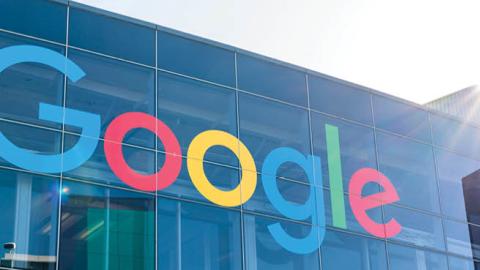You’d think we’re living in a dystopian novel: news sites are blocked, politicians are prevented from reaching constituents, speech is arbitrarily labeled as “false,” and history is “ forgotten. ” But this isn’t Orwell’s Airstrip One in 1984. It’s America in 2020.
You don’t need to be a conspiracy theorist to see this in action. In late July, Breitbart and other websites that support the Trump administration mysteriously disappeared from Google's search results, leading some to believe that Google might maintain a “blacklist” of disfavored websites that it either buries or outright blocks from its search results. We wanted to see if this was true, so we conducted a search for the terms “Azar” and “Taiwan” on both Google and DuckDuckGo, a Google competitor focused on user privacy. For context, Secretary of Health and Human Services Alex Azar recently visited Taiwan.
The results were unsurprising, but still disappointing. A Breitbart story detailing the event ranked ninth in the DuckDuckGo search. On Google, the story didn’t even break the top 50. Keep in mind, Breitbart consistently drives traffic to its website and user engagement on social media, and ranks higher in Amazon’s Alexa website rankings than either NBC News or The Wall Street Journal.
If Google were a small search engine, this sort of bias in its results might not matter. But Google dominates online search. Globally, across all platforms, Google enjoys a 92% market share.
Just as troubling is the emerging trend of Twitter, Facebook, YouTube, and other social media platforms isolating select material for a sort of truthfulness test, with accompanying labels or disclaimers designating the content as harmful or problematic. Two distinct problems emerge here.
First, truth, much like beauty, is often in the eyes of the beholder. To claim a monopoly on the truth is to display a stunning lack of humility. Yet this is precisely what Facebook has done, going so far to create an “ Oversight Board ” to deal with “significant” and “difficult” cases of content moderation on the platform.
Of course, hard truths about life are more likely to emerge from the vigorous exchange of ideas than the ex ante blocking of them. John Stuart Mill thought as much. And indeed, such a “marketplace of ideas” is the very foundation of First Amendment free expression in America, as the Supreme Court has repeatedly found.
Second, these “truth” tests seem to be applied much more intensively to certain speakers than to others. With 500 hours of video uploaded to YouTube every minute, and similarly endless numbers of tweets and Facebook posts uploaded regularly, social media platforms cannot plausibly check for “truth” in each user upload. Yet somehow, conservative political figures appear to be targeted more often than other figures.
Conservatives who are victims of this sort of unfair targeting are rightly upset. Some have called for government regulation of these practices under antitrust and similar existing laws. Others have called for new laws that would impose new forms of regulation. One such proposal would condition social media platforms’ Section 230 liability protections on whether the Federal Trade Commission determines its content moderation policies are not “politically biased.”
But despite the seriousness and severity of social media platforms’ abuse of conservative figures, government regulation is not the proper response here. Beyond such actions’ dubious constitutionality, they would simply swap private censors for government ones. Such a scenario only benefits the ruling political party, and of course, this changes over time. America is a nation of laws, not men.
Moreover, markets will inevitably punish such bias. Consumers, as well as businesses that sell to them, have a deep and abiding interest in discovering new information. Therefore, and perhaps to the dismay of Google executives, millions of Americans still regularly read Breitbart. Advertisers in competitive industries pay Google not to support some political stance, but instead to find customers—yes, even those who visit Breitbart and other disfavored sites. Armed with data demonstrating political bias—perhaps by a third-party study—competitive advertisers could insist that Google take politics out of its business model. If Google refuses such a demand, these advertisers could find new ways to reach the millions of Americans who read Breitbart and similar sites, resulting in reduced revenues for Google and ultimately, shareholder backlash.
Consumers would also be interested in such a third-party study examining online political bias. Revelation of such bias in search, for example, might lead some consumers to switch away from Google to one of its competitors. This, in turn, would pressure Google to change its ways. Government agencies need not regulate such third-party tests, nor regulate search engines themselves. However, they may reasonably publicize the results of these third-party reports—particularly if asked to do so by irate members of Congress.
Beyond search, advertisers are also interested in the efficient use of social media. One of the great strengths of social media is that anyone can participate. But if social media is limited only to those with certain political views approved by a shadowy Truth Board, trust in social media, as well as social media participation, will fall. Advertisers want to reach all consumers, regardless of their political views. Thus, when social media platforms marginalize certain political views, they not only harm the entertainment and enlightenment of individual users. They also endanger the livelihood of advertisers who seek to efficiently reach as many individuals as possible on these platforms. At a certain point, efficient advertisers will not stand for this, instead finding new ways of reaching consumers. Decreased revenues will ultimately force the hands of Facebook and Twitter to enact meaningful change.
Consumers will also abandon social media platforms if they deem the political bias to be intolerable. Indeed, many already have. Government agencies need not regulate to solve this problem. But again, they may reasonably publicize third-party reports examining this issue.
Let us not forget that in 1984, the enemy that controlled what people could see, hear, and ultimately think, was an authoritarian government, not private industry. Resistance came not from more government control of speech, but instead individuals rebelling against this dystopia. The same remedy applies today. If we replace private speech censors with government ones, we will simply be replacing one form of control with another—one with far greater reach, power, and destructive consequences for free speech and individual liberty in America.
Read in RealClear Markets




















